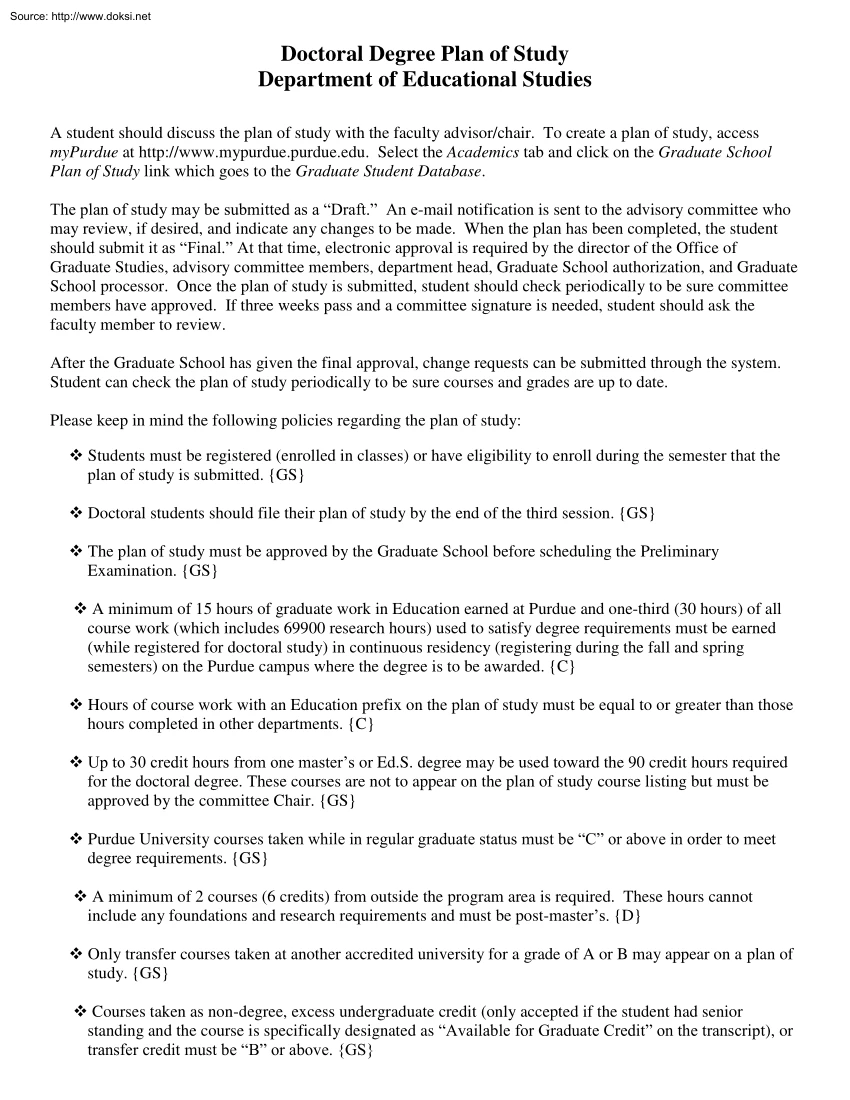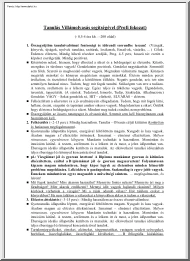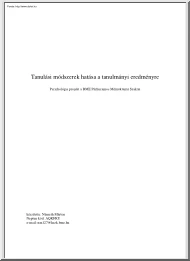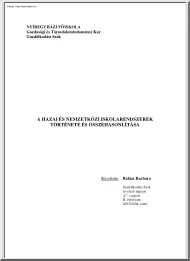Datasheet
Year, pagecount:2016, 5 page(s)
Language:English
Downloads:2
Uploaded:December 11, 2017
Size:601 KB
Institution:
-
Comments:
Attachment:-
Download in PDF:Please log in!
Comments
No comments yet. You can be the first!Content extract
Source: http://www.doksinet Doctoral Degree Plan of Study Department of Educational Studies A student should discuss the plan of study with the faculty advisor/chair. To create a plan of study, access myPurdue at http://www.mypurduepurdueedu Select the Academics tab and click on the Graduate School Plan of Study link which goes to the Graduate Student Database. The plan of study may be submitted as a “Draft.” An e-mail notification is sent to the advisory committee who may review, if desired, and indicate any changes to be made. When the plan has been completed, the student should submit it as “Final.” At that time, electronic approval is required by the director of the Office of Graduate Studies, advisory committee members, department head, Graduate School authorization, and Graduate School processor. Once the plan of study is submitted, student should check periodically to be sure committee members have approved. If three weeks pass and a committee signature is needed,
student should ask the faculty member to review. After the Graduate School has given the final approval, change requests can be submitted through the system. Student can check the plan of study periodically to be sure courses and grades are up to date. Please keep in mind the following policies regarding the plan of study: Students must be registered (enrolled in classes) or have eligibility to enroll during the semester that the plan of study is submitted. {GS} Doctoral students should file their plan of study by the end of the third session. {GS} The plan of study must be approved by the Graduate School before scheduling the Preliminary Examination. {GS} A minimum of 15 hours of graduate work in Education earned at Purdue and one-third (30 hours) of all course work (which includes 69900 research hours) used to satisfy degree requirements must be earned (while registered for doctoral study) in continuous residency (registering during the fall and spring semesters) on
the Purdue campus where the degree is to be awarded. {C} Hours of course work with an Education prefix on the plan of study must be equal to or greater than those hours completed in other departments. {C} Up to 30 credit hours from one master’s or Ed.S degree may be used toward the 90 credit hours required for the doctoral degree. These courses are not to appear on the plan of study course listing but must be approved by the committee Chair. {GS} Purdue University courses taken while in regular graduate status must be “C” or above in order to meet degree requirements. {GS} A minimum of 2 courses (6 credits) from outside the program area is required. These hours cannot include any foundations and research requirements and must be post-master’s. {D} Only transfer courses taken at another accredited university for a grade of A or B may appear on a plan of study. {GS} Courses taken as non-degree, excess undergraduate credit (only accepted if the student had
senior standing and the course is specifically designated as “Available for Graduate Credit” on the transcript), or transfer credit must be “B” or above. {GS} Source: http://www.doksinet Up to 12 credits taken while in post-baccalaureate or teacher license status (including any undergraduate excess credits) with a grade of “B” or better may be considered for use on a plan of study for an advanced degree. If requesting more than 12 credit hours, a waiver request* must be submitted for approval. {GS} Courses taken, as Pass/Fail or audited may NOT be used on a plan of study. Departmental credit for a course cannot be used. {GS} A maximum of 18 credits will be allowed from any one semester (9 credit hours for the summer session) on a plan of study. {GS} Courses over 5 years of age must be approved for use on the plan of study by the Committee Chair. {D} A waiver request* must be submitted if courses for use on the plan of study were taken prior to having
a lapse of five years of graduate study. {GS} Courses taken as 59000/59100 are limited to 15 credit hours. {D} If requesting to use more than 15 hours, a waiver request* must be submitted for approval. Fifteen hours of required foundations and research requirements should be listed (see page 3). A student’s chair/committee can approve equivalent courses for EDPS 53300 and EDPS 63000. If using an equivalent course, note this in the comments section. A waiver request* must be submitted for any other foundations and research requirements substitutions to be approved by the Department of Educational Studies Curriculum and Graduate Committee. {D} The number of thesis research hours (69900) should be noted by the student in the comments section and will apply toward the number of hours needed for the degree. These hours are not listed with courses {GS} A waiver request* to use 30000 and 40000 level course work on a plan of study (when taken as a graduate student at Purdue
University) may be considered by the department’s graduate committee. {C} With an approved waiver, 30000 and 40000 level course work may not exceed six credit hours. {GS} Committee must have a minimum of 3 members of whom 51% must be regular Purdue faculty with Graduate School certification. {GS} The committee chair or at least one co-chair must be from the EDST program area where the student is admitted. {D} One member of the committee must be from student’s related area. {D} The “Advisor in the Area of ” field must be completed in the committee section. {D} GS=Graduate School Policy C=College Policy D=Department Policy *Waiver Request Form http://www.educationpurdueedu/gradoffice/currentSt/poshtml or request through Office of Graduate Studies Office of Graduate Studies College of Education/Purdue University education-gradoffice@purdue.edu, 765-494-2345 U:GradOfficeInformation SheetsPOS Policies 02/16 Source: http://www.doksinet Department of
Educational Studies Foundations and Research Requirements A Doctoral degree plan of study shall include a minimum of two (2) foundational statistics courses (6 credits); one (1) advanced statistics, research methods or measurement course (3 credits) in addition to the departmental foundational research methods course required for a Master’s and Educational Specialist degree plan of study (i.e, EDPS 53300 or equivalent); and one (1) departmental advanced research methods course (3 credits) These requirements take effect and begin with graduate students admitted to EDST degree programs after December 31, 2002. (Department Policy, Approved EDST Faculty 9/5/02; course list updated by the EDST Curriculum and Graduate Committee 11/11/10). New courses, EDPS 55600 and EDPS 55700, added on 7/20/15. Note: Students should consult the schedule for availability of courses. I. Two (2) Foundational Statistics Courses EDPS 55600-Intro. to Quantitative Data Analysis Methods in Education I and EDPS
55700-Intro. to Quantitative Data Analysis Methods in Education II STAT 50100-Experimental Statistics I and STAT 50200*-Experimental Statistics II STAT 51100-Statitistical Methods and STAT 51200-Applied Regression Analysis PSY 60000-Statistical Inference and PSY 60100-Correlation & Experimental Design SOC 58000-Methods of Social Research I and SOC 68000-Advanced Social Research Methods (Courses may be mixed, first in one series and second in another; e.g, STAT 50100 and SOC 68000) II. One (1) Advanced Statistics, Research Methods and/or Measurement Course * AMST ANTH ANTH CDFS CDFS CDFS COM EDCI EDCI EDPS EDPS EDPS EDPS EDPS EDPS POL POL PSY PSY SOC SOC SOC STAT STAT STAT STAT STAT STAT 62000-Archival Theory & Practice (Cultural Foundations) 60500-Seminar in Ethnographic Analysis (Cultural Foundations) 60600-The Conduct of Anthropological Inquiry 61500-Research Methods in Child & Family Study 61700-Advanced Research Methods in Child & Family Study 62700-Multilevel
Modeling in Developmental and Family Research 68200-Seminar: Special Topics in Quantitative Research 61500-Qualitative Research Methods in Education 61600-Advanced Qualitative Research Methods in Education 58800-Single Subject Research Design 61900-Counseling Psychology Research Practicum 63500-Psychometric Theory and Application 63600-Item Response Theory 63700-Data Analytic Procedures for Applied Research 63800-Factor Analytic Procedures 60500-Research Design & Methods 60600-Advanced Quantitative Techniques in Political Science 60500-Applied Multivariate Analysis 63100-Applied Multiple Regression Analysis for the Behavioral Sciences 58300-Application of Social Research Methods 68100-Selected Problems of Social Research (Cultural Foundations) 68600-Qualitative Methods 51400-Design of Experiments 52200-Sampling & Survey Techniques 52300-Categorical Data Analysis (regional campus only) 52400-Applied Multivariate Analysis 52500-Intermediate Statistical Methodology 52600-Advanced
Statistical Methodology Source: http://www.doksinet EDST Foundational and Research Requirements (cont.) III. One (1) Departmental Advanced Research Methods Course * EDPS 63000-Research Procedures in Education *CDFS 61700 may be substituted for STAT 50200 *Other appropriate courses including advanced EDST research seminars (e.g, EDPS 63100, 63200, 63300, 66400) to meet Category II will be considered upon graduate student petition by the Graduate and Curriculum Committee on a case-by-case basis using the waiver request form. *It is recommended EDPS 63000 be taken after completing a Category II course. ALTERNATE PATH TO EDST RESEARCH & METHODOLOGY CORE (HANDLING EXCEPTIONS TO THE EDST CORE) Current EDST departmental policy stipulates the following research methodology core: 1. 2. 3. 4. One foundational research methods course (EDPS 53300; 3 credits); Two foundational statistics courses (6 credits); One advanced statistics, research methods, or measurement course (3 credits);
One departmental advanced methods research course (EDPS 63000; 3 credits). The departmental core methodology requirements are intended to provide discipline-specific competencies that support the development of methodological expertise across the EDST areas of study. As such, the requirements meet the needs of the majority of graduate students who are seeking graduate degrees in a variety of areas within the department. It is recognized however, that in some cases, (eg, history and philosophy of education) there arises a need for a different, yet just as rigorous path, to the development of methodological expertise. Therefore, in the rare case that a student’s program of study must be built on an alternate, discipline-specific and rigorous methodological course sequence, the department will consider exceptions to the foundational requirements. These exceptions will be handled by the EDST Curriculum & Graduate Committee on a case by case basis. In the rare case that an exception
to the EDST methodology core is indicated, the following information needs to be provided to the EDST Curriculum & Graduate Committee: The student’s vita. A letter from the student outlining: o his/her areas of focus and professional goals; o the proposed program of study; o the proposed alternate path to a methodology core and advanced methodology coursework (at least 15 credit hours); o the ways in which the proposed methodology coursework meets the needs for methodological and content-specific expertise in the area of study. Source: http://www.doksinet A letter from the student’s advisor co-signed by a second faculty member with expertise in the proposed area of study. The letter should: o describe the student’s area of study; o address and provide documentation for discipline-specific methodological standards and norms in the student’s program of study; o outline an alternate path of a methodology core and advanced coursework (at least 16 credit hours);
o provide evidence for the feasibility of the alternate path for core and advanced coursework, given specific course options and offerings in the COE and/or other Purdue programs. Review Timeline and Submission of Materials Alternate path cases may be considered during the regularly scheduled meetings of the committee in the Fall semester and all but the January meetings of the Spring semester. The January meeting is reserved for review of fellowships and awards. All materials must be submitted at least three weeks prior to the meeting of the EDST Curriculum & Graduate Committee. Materials should be submitted to the EDST head secretary with a copy to the chair of the EDST Curriculum and Graduate committee. The advisor, graduate student, and supporting faculty member may be requested to appear during the EDST Committee’s meeting to present the case and respond to questions. (Departmental Policy, Approved EDST Curriculum & Graduate Committee – EDST Faculty
Meeting 3/22/12)
student should ask the faculty member to review. After the Graduate School has given the final approval, change requests can be submitted through the system. Student can check the plan of study periodically to be sure courses and grades are up to date. Please keep in mind the following policies regarding the plan of study: Students must be registered (enrolled in classes) or have eligibility to enroll during the semester that the plan of study is submitted. {GS} Doctoral students should file their plan of study by the end of the third session. {GS} The plan of study must be approved by the Graduate School before scheduling the Preliminary Examination. {GS} A minimum of 15 hours of graduate work in Education earned at Purdue and one-third (30 hours) of all course work (which includes 69900 research hours) used to satisfy degree requirements must be earned (while registered for doctoral study) in continuous residency (registering during the fall and spring semesters) on
the Purdue campus where the degree is to be awarded. {C} Hours of course work with an Education prefix on the plan of study must be equal to or greater than those hours completed in other departments. {C} Up to 30 credit hours from one master’s or Ed.S degree may be used toward the 90 credit hours required for the doctoral degree. These courses are not to appear on the plan of study course listing but must be approved by the committee Chair. {GS} Purdue University courses taken while in regular graduate status must be “C” or above in order to meet degree requirements. {GS} A minimum of 2 courses (6 credits) from outside the program area is required. These hours cannot include any foundations and research requirements and must be post-master’s. {D} Only transfer courses taken at another accredited university for a grade of A or B may appear on a plan of study. {GS} Courses taken as non-degree, excess undergraduate credit (only accepted if the student had
senior standing and the course is specifically designated as “Available for Graduate Credit” on the transcript), or transfer credit must be “B” or above. {GS} Source: http://www.doksinet Up to 12 credits taken while in post-baccalaureate or teacher license status (including any undergraduate excess credits) with a grade of “B” or better may be considered for use on a plan of study for an advanced degree. If requesting more than 12 credit hours, a waiver request* must be submitted for approval. {GS} Courses taken, as Pass/Fail or audited may NOT be used on a plan of study. Departmental credit for a course cannot be used. {GS} A maximum of 18 credits will be allowed from any one semester (9 credit hours for the summer session) on a plan of study. {GS} Courses over 5 years of age must be approved for use on the plan of study by the Committee Chair. {D} A waiver request* must be submitted if courses for use on the plan of study were taken prior to having
a lapse of five years of graduate study. {GS} Courses taken as 59000/59100 are limited to 15 credit hours. {D} If requesting to use more than 15 hours, a waiver request* must be submitted for approval. Fifteen hours of required foundations and research requirements should be listed (see page 3). A student’s chair/committee can approve equivalent courses for EDPS 53300 and EDPS 63000. If using an equivalent course, note this in the comments section. A waiver request* must be submitted for any other foundations and research requirements substitutions to be approved by the Department of Educational Studies Curriculum and Graduate Committee. {D} The number of thesis research hours (69900) should be noted by the student in the comments section and will apply toward the number of hours needed for the degree. These hours are not listed with courses {GS} A waiver request* to use 30000 and 40000 level course work on a plan of study (when taken as a graduate student at Purdue
University) may be considered by the department’s graduate committee. {C} With an approved waiver, 30000 and 40000 level course work may not exceed six credit hours. {GS} Committee must have a minimum of 3 members of whom 51% must be regular Purdue faculty with Graduate School certification. {GS} The committee chair or at least one co-chair must be from the EDST program area where the student is admitted. {D} One member of the committee must be from student’s related area. {D} The “Advisor in the Area of ” field must be completed in the committee section. {D} GS=Graduate School Policy C=College Policy D=Department Policy *Waiver Request Form http://www.educationpurdueedu/gradoffice/currentSt/poshtml or request through Office of Graduate Studies Office of Graduate Studies College of Education/Purdue University education-gradoffice@purdue.edu, 765-494-2345 U:GradOfficeInformation SheetsPOS Policies 02/16 Source: http://www.doksinet Department of
Educational Studies Foundations and Research Requirements A Doctoral degree plan of study shall include a minimum of two (2) foundational statistics courses (6 credits); one (1) advanced statistics, research methods or measurement course (3 credits) in addition to the departmental foundational research methods course required for a Master’s and Educational Specialist degree plan of study (i.e, EDPS 53300 or equivalent); and one (1) departmental advanced research methods course (3 credits) These requirements take effect and begin with graduate students admitted to EDST degree programs after December 31, 2002. (Department Policy, Approved EDST Faculty 9/5/02; course list updated by the EDST Curriculum and Graduate Committee 11/11/10). New courses, EDPS 55600 and EDPS 55700, added on 7/20/15. Note: Students should consult the schedule for availability of courses. I. Two (2) Foundational Statistics Courses EDPS 55600-Intro. to Quantitative Data Analysis Methods in Education I and EDPS
55700-Intro. to Quantitative Data Analysis Methods in Education II STAT 50100-Experimental Statistics I and STAT 50200*-Experimental Statistics II STAT 51100-Statitistical Methods and STAT 51200-Applied Regression Analysis PSY 60000-Statistical Inference and PSY 60100-Correlation & Experimental Design SOC 58000-Methods of Social Research I and SOC 68000-Advanced Social Research Methods (Courses may be mixed, first in one series and second in another; e.g, STAT 50100 and SOC 68000) II. One (1) Advanced Statistics, Research Methods and/or Measurement Course * AMST ANTH ANTH CDFS CDFS CDFS COM EDCI EDCI EDPS EDPS EDPS EDPS EDPS EDPS POL POL PSY PSY SOC SOC SOC STAT STAT STAT STAT STAT STAT 62000-Archival Theory & Practice (Cultural Foundations) 60500-Seminar in Ethnographic Analysis (Cultural Foundations) 60600-The Conduct of Anthropological Inquiry 61500-Research Methods in Child & Family Study 61700-Advanced Research Methods in Child & Family Study 62700-Multilevel
Modeling in Developmental and Family Research 68200-Seminar: Special Topics in Quantitative Research 61500-Qualitative Research Methods in Education 61600-Advanced Qualitative Research Methods in Education 58800-Single Subject Research Design 61900-Counseling Psychology Research Practicum 63500-Psychometric Theory and Application 63600-Item Response Theory 63700-Data Analytic Procedures for Applied Research 63800-Factor Analytic Procedures 60500-Research Design & Methods 60600-Advanced Quantitative Techniques in Political Science 60500-Applied Multivariate Analysis 63100-Applied Multiple Regression Analysis for the Behavioral Sciences 58300-Application of Social Research Methods 68100-Selected Problems of Social Research (Cultural Foundations) 68600-Qualitative Methods 51400-Design of Experiments 52200-Sampling & Survey Techniques 52300-Categorical Data Analysis (regional campus only) 52400-Applied Multivariate Analysis 52500-Intermediate Statistical Methodology 52600-Advanced
Statistical Methodology Source: http://www.doksinet EDST Foundational and Research Requirements (cont.) III. One (1) Departmental Advanced Research Methods Course * EDPS 63000-Research Procedures in Education *CDFS 61700 may be substituted for STAT 50200 *Other appropriate courses including advanced EDST research seminars (e.g, EDPS 63100, 63200, 63300, 66400) to meet Category II will be considered upon graduate student petition by the Graduate and Curriculum Committee on a case-by-case basis using the waiver request form. *It is recommended EDPS 63000 be taken after completing a Category II course. ALTERNATE PATH TO EDST RESEARCH & METHODOLOGY CORE (HANDLING EXCEPTIONS TO THE EDST CORE) Current EDST departmental policy stipulates the following research methodology core: 1. 2. 3. 4. One foundational research methods course (EDPS 53300; 3 credits); Two foundational statistics courses (6 credits); One advanced statistics, research methods, or measurement course (3 credits);
One departmental advanced methods research course (EDPS 63000; 3 credits). The departmental core methodology requirements are intended to provide discipline-specific competencies that support the development of methodological expertise across the EDST areas of study. As such, the requirements meet the needs of the majority of graduate students who are seeking graduate degrees in a variety of areas within the department. It is recognized however, that in some cases, (eg, history and philosophy of education) there arises a need for a different, yet just as rigorous path, to the development of methodological expertise. Therefore, in the rare case that a student’s program of study must be built on an alternate, discipline-specific and rigorous methodological course sequence, the department will consider exceptions to the foundational requirements. These exceptions will be handled by the EDST Curriculum & Graduate Committee on a case by case basis. In the rare case that an exception
to the EDST methodology core is indicated, the following information needs to be provided to the EDST Curriculum & Graduate Committee: The student’s vita. A letter from the student outlining: o his/her areas of focus and professional goals; o the proposed program of study; o the proposed alternate path to a methodology core and advanced methodology coursework (at least 15 credit hours); o the ways in which the proposed methodology coursework meets the needs for methodological and content-specific expertise in the area of study. Source: http://www.doksinet A letter from the student’s advisor co-signed by a second faculty member with expertise in the proposed area of study. The letter should: o describe the student’s area of study; o address and provide documentation for discipline-specific methodological standards and norms in the student’s program of study; o outline an alternate path of a methodology core and advanced coursework (at least 16 credit hours);
o provide evidence for the feasibility of the alternate path for core and advanced coursework, given specific course options and offerings in the COE and/or other Purdue programs. Review Timeline and Submission of Materials Alternate path cases may be considered during the regularly scheduled meetings of the committee in the Fall semester and all but the January meetings of the Spring semester. The January meeting is reserved for review of fellowships and awards. All materials must be submitted at least three weeks prior to the meeting of the EDST Curriculum & Graduate Committee. Materials should be submitted to the EDST head secretary with a copy to the chair of the EDST Curriculum and Graduate committee. The advisor, graduate student, and supporting faculty member may be requested to appear during the EDST Committee’s meeting to present the case and respond to questions. (Departmental Policy, Approved EDST Curriculum & Graduate Committee – EDST Faculty
Meeting 3/22/12)





